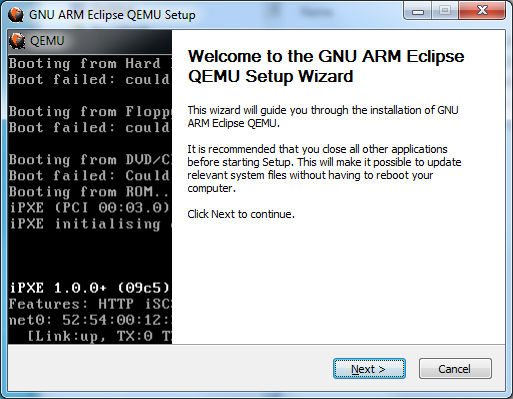

Normally we would assemble and link it with the native AS and LD. * syscall write(int fd, const void *buf, size_t count) */ Suppose we want to assemble the following hello world assembly program. There are different assemblers available on different platforms, such as the GNU assembler “as” which is also used to assemble the Linux kernel, the ARM Toolchain assembler “ armasm”, or the Microsoft assembler with the same name (“ armasm”) included in Visual Studio. The programs that perform this task are called assemblers.
#Qemu system arm windows code#
Since processors only understand machine code and not assembly language directly, we need a program to convert our hand-written assembly instructions into their machine-code equivalents.
#Qemu system arm windows how to#
Now that we know how to compile code for the Arm architecture and run it on an x86_64 host, let’s try this with assembly source code.

aarch64-linux-gnu-gcc -o hello64dyn qemu-aarch64 -L /usr/aarch64-linux-gnu. In order to run it, we need to use qemu-aarch64 and supply the aarch64 libraries via the -L flag. This time, the package that makes this possible is qemu-user.įirst, compile the C code without the -static flag. But can we execute a dynamically linked Arm executable? Yes, we can. Voilà, our statically linked aarch64 binary is running on our x86_64 host thanks to qemu-user-static. Hello64: ELF 64-bit LSB executable, ARM aarch64, version 1 (GNU/Linux), statically linked, BuildID=66307a9ec0ecfdcb05002f8ceecd310cc6f6792e, for GNU/Linux 3.7.0, not stripped The binary we have previously compiled is ARM aarch64. Let’s try it out.īelow you can see that our host is a x86_64 GNU/Linux system. Lucky for us, we can bypass this restriction with the QEMU user emulator which allows us to run binaries for other architectures on our host system. We can’t run our Arm binary on an x84_64 architecture because instructions are encoded differently on these two architectures. hello64: cannot execute binary file: Exec format error aarch64-linux-gnu-gcc -static -o hello64 hello.cīut what happens if we run this Arm executable on a different architecture? Executing it on an x86_64 architecture would normally result in an error telling us that the binary file cannot be executed due to an error in the executable format./hello64īash. To compile the code as a static executable, we can use aarch64-linux-gnu-gcc with the -static flag. Return printf("Hello, I'm executing ARM64 instructions!\n") Once installed, create a file containing a simple C program for testing, e.g.
#Qemu system arm windows install#
Let’s start with Arm64 and install the following packages: sudo apt update -y & sudo apt upgrade sudo apt install qemu-user qemu-user-static gcc-aarch64-linux-gnu binutils-aarch64-linux-gnu binutils-aarch64-linux-gnu-dbg build-essential In order to compile our code for the Arm architecture, we need to use a cross-compiler. However the GCC compiler you have on your system compiles your code for the architecture of the system it runs on, in this case x86_64. Since processors don’t understand high-level source code directly, we need to convert our C code into machine-code using a compiler. FYI: In this tutorial, I’m using an Ubuntu 20.04.1 LTS VM as a host system.


 0 kommentar(er)
0 kommentar(er)
